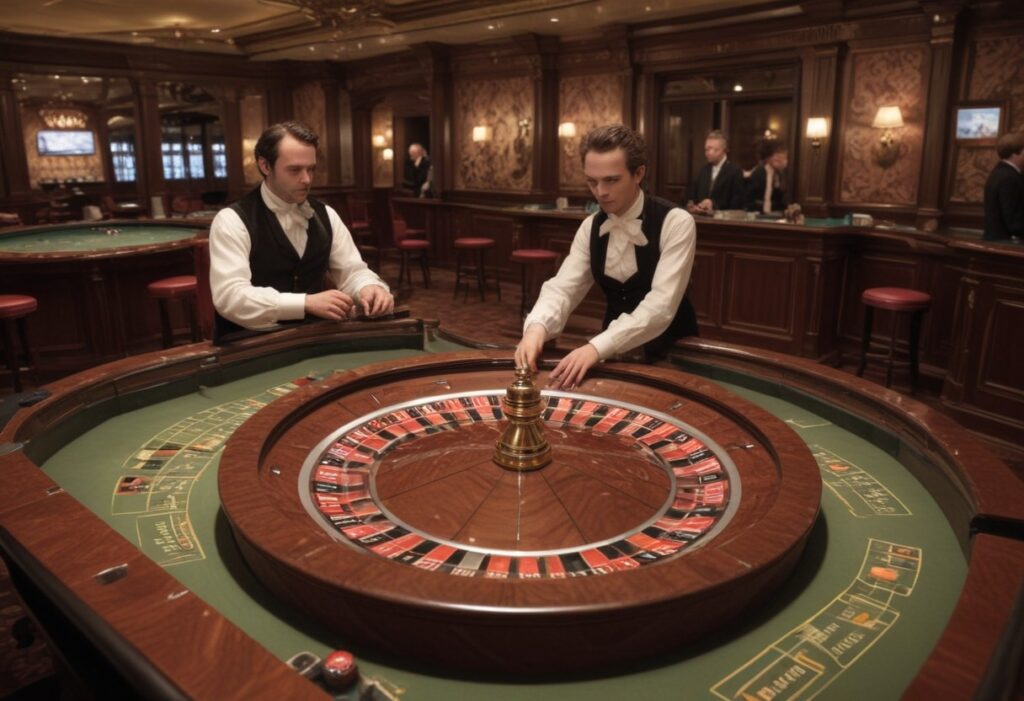ueno-kohsei.com – Final Bets, Roulette, with its rich history dating back over centuries, has evolved into one of the most iconic games in the gambling world. Among the various betting options it offers, hold a special place. These bets, also known as “finale bets,” are unique wagering options that have historical roots in the traditional European roulette scene. This article explores the history and origins of final bets in roulette, providing insights into how this classic strategy enhances the game and offers intriguing possibilities for players.
The Concept of Final Bets:
In it roulette involve placing a bet on all numbers that end with the same digit. For example, a final bet on “4” would cover 4, 14, 24, and 34 in a single-zero roulette game. This type of bet focuses on the layout pattern and number endings rather than sequences or colors, offering a distinct approach to the game’s strategy.
Historical Background:
- European Origins:
- Final bets are believed to have originated from French Roulette, which itself started in the 18th century. The betting style was introduced as part of the broader range of call bets, which are announced to the dealer rather than placing chips on the table.
- Popularity in Casinos:
- As roulette spread across Europe and later to other parts of the world, the strategy of final bets became popular among players who preferred comprehensive and pattern-based betting systems. Its inclusion in the traditional call bets menu highlighted its acceptance and integration into the roulette culture.
Strategic Implications of Final Bets:
- Ease of Play:
- One of the key attractions of final bets is their simplicity. Players can quickly cover multiple numbers with a single declaration, making it an easy strategy to adopt, especially for newcomers trying to navigate the complex betting table.
- Coverage and Probability:
- It offer a balanced way to cover the roulette wheel, as these bets span across the layout, touching various segments. This spread can sometimes work to a player’s advantage, especially in games that witness streaks or patterns.


Implementing Final Bets in Gameplay:
- Choosing the Right Numbers:
- Players typically choose final bets based on personal preferences, lucky numbers, or observational strategies that suggest certain numbers appear more frequently. Understanding wheel biases, albeit rare in modern roulette, can also influence game decisions.
- Combination with Other Strategies:
- For more comprehensive coverage, players often combine final bets with other betting strategies like the Martingale system or column betting. This combination can help manage risk and potentially increase returns.
- Risk Management:
- While It’s cover multiple numbers, they still carry the risks inherent in any roulette game. Effective bankroll management and understanding of odds are crucial when using this strategy, as the costs can add up quickly due to the multiple units wagered per spin.
Conclusion:
It is offer a fascinating glimpse into the historical and strategic aspects of roulette. As a classic betting strategy, they allow players to engage with the game in a uniquely structured way, providing both the thrill of comprehensive coverage and the challenge of strategic betting. Whether used alone or in combination with other strategies, final bets embody the blend of chance and tactic that makes roulette a perennial favorite among casino games. As roulette continues to evolve, the timeless nature of the game ensures they remain a vital part of the game’s rich tapestry.
FAQs
1. What are final bets in roulette?
Final bets, or “finales” in French, are a type of call bet in roulette where a player bets on all numbers that end with the same digit. For example, a bet on “4” would cover 4, 14, 24, and 34 in a game of European roulette. This bet is placed on the assumption that if the ball lands on any of these numbers, the player wins.
2. Where did final bets originate?
It is originated in French casinos, where roulette was developed and popularized in its current form. The concept of final bets is deeply rooted in the tradition of European roulette, reflecting the game’s emphasis on complex wagering options and an intricate layout. This betting strategy is particularly popular in European and French roulette due to its inclusion of call bets and a racetrack betting section, which simplifies the placement of such wagers.
3. How do final bets work in terms of gameplay and payouts?
A player announces their intention and the specific final number to the dealer. Depending on the casino’s rules and the roulette variant, the chip placement might differ:
Single Digit Final Bets: These bets typically cover four numbers (as in the final 4 example above) and require four chips unless one of the numbers does not exist on the wheel, like in the case of final 7 in European roulette, which only covers three numbers (7, 17, 27).
Payouts: Each winning final bet is paid out at the standard odds for a straight-up bet, which is 35:1 in roulette, minus the chips placed on losing numbers.
4. What makes final bets appealing to players?
Final bets appeal to players for several reasons:
Simplicity: Once familiar with the concept, final bets are straightforward and easy to remember.
Coverage: These bets allow players to cover multiple numbers with a single bet type.
Strategy: Some players use final bets as part of a larger betting strategy, particularly if they feel that the roulette wheel exhibits some form of bias toward certain wheel sections or numbers.
5. Are there any strategies specifically associated with final bets?
While there is no foolproof betting strategy in roulette due to its reliance on chance, some players incorporate the bets into their broader roulette strategy by:
Combining Bets: Mixing final bets with other types of bets, such as outside bets, can provide more coverage and balance the risk.
Pattern Betting: Some players track the frequency of winning numbers and adjust their final bets accordingly if they believe certain numbers or wheel sections are “hot.”
Bankroll Management: As with all betting strategies, managing one’s bankroll is crucial. Setting limits for wins and losses when playing final bets can help maintain a healthy balance.
